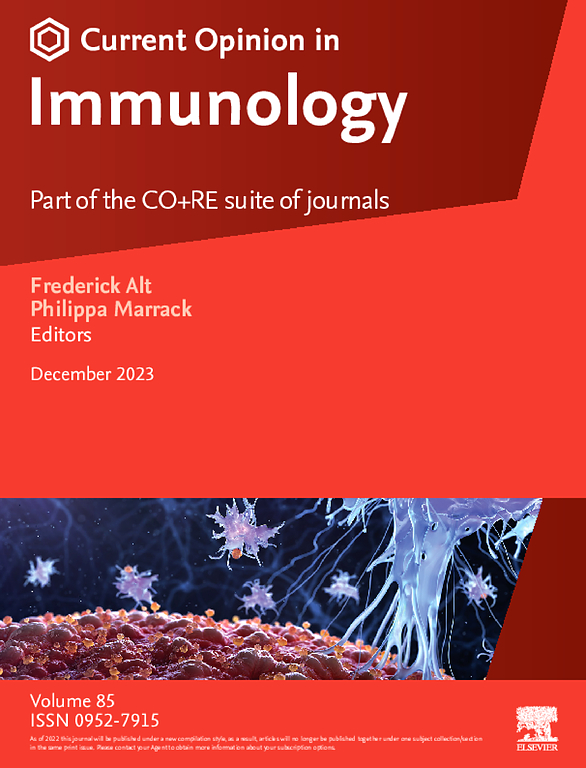Macrophage barrier responses to oncogenic transformation
IF 6.6
2区 医学
Q1 IMMUNOLOGY
引用次数: 0
Abstract
The well-documented protumorigenic roles of macrophages in advanced cancers can sometimes overshadow their beneficial functions in the earlier stages of tumor development. This essay explores the hypothesis that macrophages play a crucial protective role in premalignant tissues by sensing and responding to early oncogenic transformation. Their activity is closely intertwined with cell-intrinsic barriers to transformation — such as apoptosis, senescence, and DNA repair — which collectively work to suppress malignant progression. Thus, an integrated cell-intrinsic and macrophage response constitutes effective ‘oncogenic monitoring’. In premalignant tissues, macrophages interpret outputs of cell-intrinsic tumor suppression as oncogenic stress signals detected through innate immune sensors, initiating a protective, homeostatic response that mitigates potential progression to malignancy. By recontextualizing macrophage roles in the early immune landscape, it becomes evident that these cells can serve as key protectors, preventing or delaying tumor formation. Understanding this dual role of macrophages — protective in early tumorigenesis and protumorigenic in established cancers — offers new perspectives on harnessing their immune functions for cancer prevention and therapy.
巨噬细胞屏障对致癌转化的反应
巨噬细胞在晚期癌症中的致瘤作用有时会掩盖其在肿瘤发展早期的有益功能。本文探讨了巨噬细胞通过感知和响应早期致癌转化在癌前组织中发挥重要保护作用的假设。它们的活性与细胞内在的转化障碍密切相关,如细胞凋亡、衰老和DNA修复,这些障碍共同抑制恶性进展。因此,细胞内在和巨噬细胞的综合反应构成了有效的“致癌监测”。在癌前组织中,巨噬细胞将细胞内在肿瘤抑制的输出解释为通过先天免疫传感器检测到的致癌应激信号,启动保护性、稳态反应,减轻潜在的恶性进展。通过重新定位巨噬细胞在早期免疫环境中的作用,很明显这些细胞可以作为关键的保护因子,预防或延迟肿瘤的形成。了解巨噬细胞的双重作用——在早期肿瘤发生中的保护作用和在已建立的癌症中的致瘤作用——为利用其免疫功能预防和治疗癌症提供了新的视角。
本文章由计算机程序翻译,如有差异,请以英文原文为准。
求助全文
约1分钟内获得全文
求助全文
来源期刊
CiteScore
13.30
自引率
1.40%
发文量
94
审稿时长
67 days
期刊介绍:
Current Opinion in Immunology aims to stimulate scientifically grounded, interdisciplinary, multi-scale debate and exchange of ideas. It contains polished, concise and timely reviews and opinions, with particular emphasis on those articles published in the past two years. In addition to describing recent trends, the authors are encouraged to give their subjective opinion of the topics discussed.
In Current Opinion in Immunology we help the reader by providing in a systematic manner: 1. The views of experts on current advances in their field in a clear and readable form. 2. Evaluations of the most interesting papers, annotated by experts, from the great wealth of original publications.
Current Opinion in Immunology will serve as an invaluable source of information for researchers, lecturers, teachers, professionals, policy makers and students.
Current Opinion in Immunology builds on Elsevier''s reputation for excellence in scientific publishing and long-standing commitment to communicating reproducible biomedical research targeted at improving human health. It is a companion to the new Gold Open Access journal Current Research in Immunology and is part of the Current Opinion and Research(CO+RE) suite of journals. All CO+RE journals leverage the Current Opinion legacy-of editorial excellence, high-impact, and global reach-to ensure they are a widely read resource that is integral to scientists'' workflow.

 求助内容:
求助内容: 应助结果提醒方式:
应助结果提醒方式:


